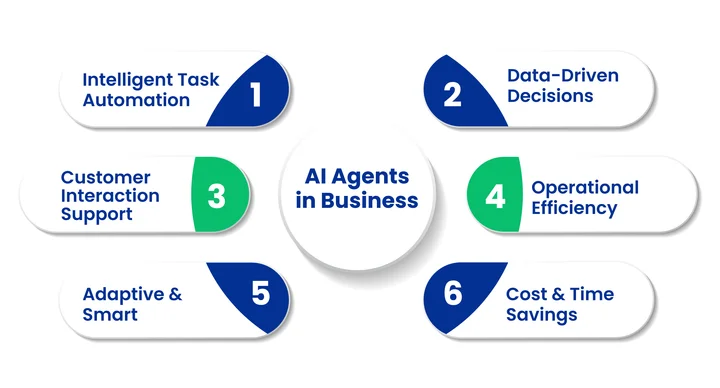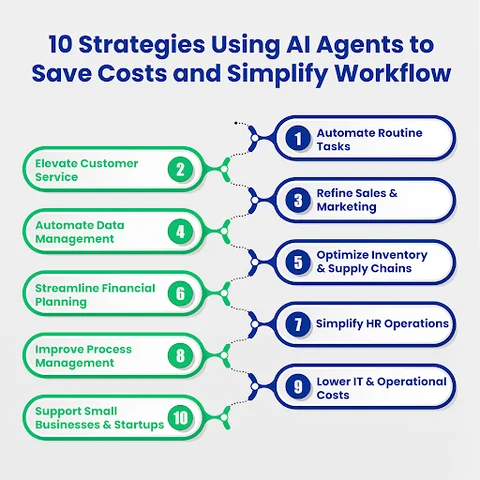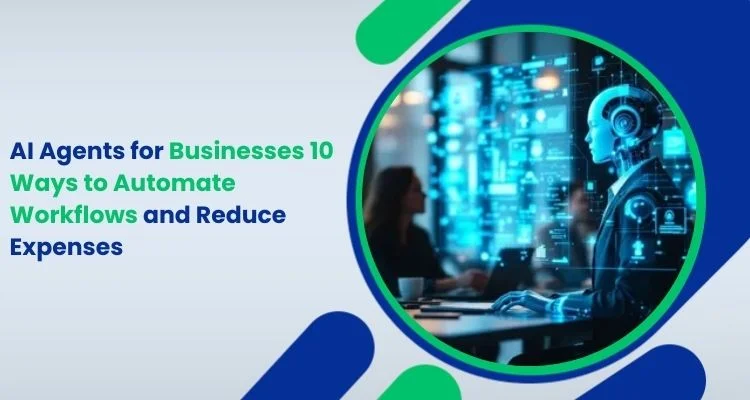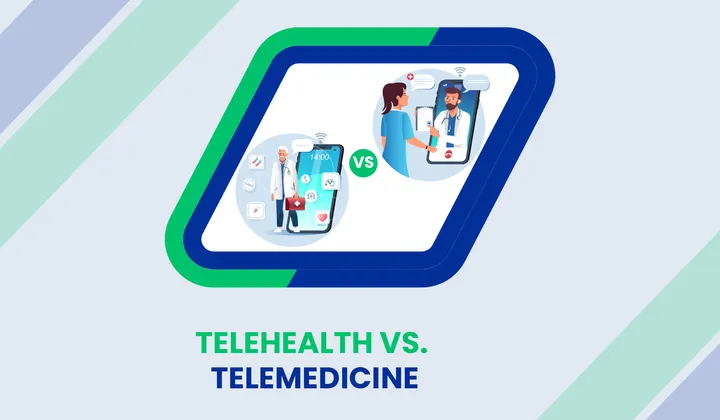Manual work, slow processes, and endless tasks sound familiar?
Every business is stuck in this productivity trap.
Research by McKinsey shows that automation technologies could save companies up to 20–30% of their operational costs by 2030. Such numbers make it clear that ignoring automation may lead to missed opportunities for growth.
Furthermore, small and medium-sized enterprises face unique challenges, as they often operate with limited budgets and fewer resources. Delays in tasks like data entry, reporting, or customer support directly impact growth.
So, should businesses continue struggling with manual workloads, or is it time to adopt intelligent business automation tools that improve efficiency and reduce expenses?
AI agents can automate repetitive tasks, streamline operations, and help businesses save both time and money, enabling teams to focus on growth and strategic priorities.
In this blog, we will explore how AI agents help businesses automate workflows and reduce costs effectively.
To start, let’s define AI agents for business and see their role in modern operations.
Table of Contents
What are AI Agents in Business?
AI agents for business are intelligent software systems designed to handle tasks that usually require human effort. They can make decisions, learn from data, and execute actions within predefined workflows. Instead of relying only on manual operations, these agents use advanced algorithms to manage routine processes efficiently.

When applied in real-world environments, AI workflow automation proves to be a valuable asset. For instance, agents can manage customer inquiries, analyze sales trends, or track inventory without constant supervision. This allows companies to focus on strategic planning while reducing unnecessary delays.
Furthermore, these business automation tools go beyond simple task execution, as they adapt to changing inputs and conditions. They serve as digital coworkers, processing data and managing customer support tickets to keep businesses running smoothly. As a result, organizations see clear benefits in both efficiency and cost savings.
How Do AI Agents Automate Business Workflows?
Workflow automation with AI agents for business begins with collecting and analyzing data. These agents review inputs such as emails, customer requests, or transaction records, then decide the best action based on pre-set rules and learned patterns.
Additionally, once decisions are made, the system executes tasks like routing support tickets, approving invoices, or scheduling meetings. Integration with business automation tools such as CRM or ERP platforms allows tasks to move seamlessly across departments.
Further, machine learning automation helps these agents improve over time. As they process more information, they learn from past actions, which leads to smarter decisions and fewer errors in business operations.
Automate repetitive tasks, reduce errors, and let your team focus on growth with AI Agents!
Now we will discuss the 10 practical ways these agents reduce expenses and drive business efficiency.
10 Ways to Reduce Expenses and Manage Workflows with AI Agents
Every business faces the challenge of keeping costs under control while maintaining productivity. Manual work, delays in decision-making, and repetitive tasks often lead to wasted resources. This is where AI agents for business step in to simplify operations and support smarter decision-making.
Additionally, workflow automation powered by intelligent agents helps businesses cut unnecessary expenses. Reports suggest that companies adopting automation see up to 30% faster task completion compared to traditional methods, which directly improves efficiency.
Let’s get a look at it!

1. Automating Repetitive Tasks
One of the most common challenges businesses face is the constant drain of repetitive work. Employees often spend hours entering data, sending routine emails, or updating records, which takes away valuable time that could be spent on strategic tasks. AI agents for business take over these repetitive workflows, reducing costs and freeing employees for higher-value contributions.
Examples of how AI workflow automation streamlines repetitive processes include:
- Data entry automation to record, process, and update information without manual effort.
- Customer email sorting and responses for frequently asked questions.
- Meeting scheduling and reminders are handled through intelligent assistants.
- Invoice processing and approvals with fewer delays.
- CRM updates that keep sales and customer data accurate.
Apart from this, Deloitte reports that organizations adopting automation can cut the workload of repetitive tasks by as much as 60%, which highlights the measurable benefits of using business automation tools.
2. Improving Customer Support with Virtual Assistants
Customer support often becomes one of the biggest expenses for businesses. Long waiting times, repetitive inquiries, and limited staff availability create frustration for both customers and employees. This is where AI agents for business provide real value through virtual assistants.
These intelligent assistants handle common customer questions instantly, guide users through troubleshooting steps, and even escalate complex issues to human staff when necessary. By reducing the number of repetitive inquiries, business automation tools lower support costs while ensuring customers receive quick responses.
Examples of how AI workflow automation improves customer support include:
- Instant responses to FAQs such as billing, product details, and policies.
- Order tracking and updates without manual intervention.
- Personalized recommendations based on customer history.
- Chatbot-to-human escalation when issues require complex solutions.
- Multilingual support that reduces the need for specialized staff.
Furthermore, AI tools for business operate 24/7, which improves accessibility without requiring extra staff shifts.
3. Optimizing Sales and Marketing Campaigns
Imagine a sales team spending weeks chasing leads, only to realize most of them were never interested in the first place. Or a marketing team sending out the same generic emails that end up in the spam folder. These common challenges waste both time and money.
This is where AI agents for business change the game. They scan customer data, study buying patterns, and highlight which leads are worth pursuing. As a result, sales teams focus on genuine prospects instead of wasting hours on cold calls that go nowhere.
At the same time, marketing campaigns powered by AI workflow automation reach the right audience at the right time. These AI tools for businesses help campaigns achieve better results with fewer resources by doing everything from automatically modifying ad placements to sending personalized product recommendations.
4. Automating Data Entry and Reporting
Manual data entry often eats up valuable time, introduces errors, and slows down decision-making. By using AI agents for business, organizations can shift this repetitive burden to intelligent systems that capture, process, and organize information automatically. This frees employees to focus on work that actually drives growth.
Here’s how AI workflow automation adds value:
- Error Reduction: Minimizes human mistakes in financials, records, and reporting.
- Real-Time Updates: Keeps dashboards and reports continuously up to date.
- Scalability: Handles massive volumes of data without extra manpower.
- Faster Decision-Making: Provides instant insights instead of waiting for manual reports.
- Compliance Support: Maintains consistent, trackable records for audits and regulations.
With these advantages, business automation tools transform data entry from a tedious necessity into a strategic asset.
5. Improving Inventory and Supply Chain Management
Imagine a business that constantly struggles with stockouts or overstocking. Products either sit in warehouses longer than needed or run out just when customers demand them most. This is where AI agents for business step in as a game-changer.
Through AI workflow automation, these agents analyze sales patterns, supplier lead times, and seasonal demand. Instead of relying on guesswork, they forecast needs with precision and adjust purchase orders automatically. For supply chain managers, this means fewer delays, optimized inventory levels, and reduced operational costs.
In short, business automation tools turn supply chains into smart, self-adjusting systems.
The result?
Smoother operations, happier customers, and a healthier bottom line.
6. Supporting Financial Analysis and Budgeting
Picture a finance team buried under endless spreadsheets, struggling to track every expense, forecast budgets, and generate reports on time. Small errors in manual work can easily snowball into costly mistakes.
AI agents change this by automating financial analysis and budgeting tasks. They track cash flow in real time, generate accurate forecasts, and flag unusual spending patterns before they become problems. Instead of reacting to financial issues, businesses can plan with confidence.
The outcome?
Smarter budget decisions, faster reporting, and a clear view of financial health, all without the manual workload.
7. Strengthening Human Resources Processes
Managing HR can be overwhelming when hiring cycles, payroll, compliance, and employee engagement all compete for attention. With AI agents for business, companies are moving away from repetitive manual work and adopting workflow automation that streamlines the employee lifecycle.
HR teams can use business automation software to analyze applications, schedule interviews, and accurately track employee performance. This does not replace human judgment but supports it with data-driven insights. The result is more time for managers to focus on employee development rather than paperwork.
Key advantages of HR automation include:
- Faster recruitment through intelligent candidate screening
- Consistent compliance monitoring across policies and labor laws
- Improved retention strategies backed by real-time analytics
In essence, HR teams equipped with AI business solutions become strategic partners, not just administrative units.
8. Enabling Smarter Business Process Management (BPM)
For many organizations, manual workflows slow down decision-making and increase operational costs. Traditional methods of managing processes often lead to delays, duplication, and errors. With business automation tools and AI workflow automation, companies can build intelligent, adaptive systems that respond to real-time business needs.
Instead of static process maps, intelligent process automation allows businesses to adjust operations dynamically. For instance, robotic process automation (RPA) can handle repetitive data entry, while machine learning automation identifies inefficiencies and optimizes resource allocation.
The true benefit lies in how business process management (BPM) evolves. Companies shift from reactive problem-solving to proactive strategy, ensuring that processes are both efficient and scalable. As organizations embrace digital transformation, they gain the ability to automate, measure, and continuously refine operations.
9. Reducing IT and Operational Costs
One of the strongest business cases for AI-powered tools is their ability to reduce business expenses without compromising quality. IT teams often spend countless hours on server monitoring, helpdesk queries, and manual system updates. These repetitive tasks increase costs and drain resources.
Businesses that use AI agents introduce AI workflow automation, which automatically resolves common IT issues. The advantages of automation in patch management, data backups, and ticket classification mount up rapidly.
The cost savings extend beyond IT. Supply chains, customer service, and finance also benefit from cost reduction through AI. Companies reduce error rates, optimize resources, and cut downtime. In practice, AI businesses improve operational resilience.
10. Assisting Small Businesses and Startups with Affordable Automation
Startups and SMEs often face tight budgets, making it difficult to compete with larger enterprises. This is where small business automation tools and AI automation for startups and SMEs create an advantage. Instead of hiring large teams, smaller firms can rely on AI tools for business to manage daily operations.
Entrepreneurs can automate business processes for a fraction of the traditional cost, from smart business tools for customer communication to AI workflow automation that manages invoicing. The accessibility of automation software for businesses levels the playing field, giving startups the same efficiency once reserved for big corporations.
The big question many founders ask is: Can AI agents save money for small businesses?
The answer is yes.
Businesses can increase customer satisfaction, scale more quickly, and achieve operational efficiency without going over budget by implementing AI business solutions.
In short, digital transformation is no longer out of reach. Affordable AI-powered tools make it possible for startups to grow smarter, not just bigger.
Final Takeaway
Rising costs, repetitive tasks, and slow workflows can drain resources and hold back growth. These 10 strategies show how AI agents advance everyday business operations. Automation helps businesses save money, increase productivity, and free up teams to concentrate on higher-value work by eliminating repetitive tasks and streamlining workflows. Implementing AI agents is about building smarter, more resilient businesses.
Companies ready to adopt intelligent solutions can implement AI Agent Development to integrate automation naturally into everyday operations and achieve measurable efficiency.
The organizations that act proactively position themselves for long-term success. Teams can reduce operational strain and build resilience for the future by automating business processes, identifying inefficiencies, and streamlining decision-making with AI.
Frequently Asked Questions (FAQs)
2. What Are The Best AI Tools To Reduce Business Costs?
AI tools can help businesses save time, reduce errors, and streamline operations. Some of the most effective options include:
- Zapier
- ChatGPT
- UiPath
- HubSpot
- QuickBooks
These tools help businesses automate manual tasks, enhance accuracy, and lower operational costs.
3. Can AI Agents Save Money For Small Businesses?
Absolutely. Small businesses and startups often operate with limited budgets and teams. AI agents help by handling time-consuming tasks at a fraction of the cost of hiring additional staff. AI reduces operational costs while improving efficiency, giving smaller businesses a competitive advantage without overspending. This includes automating invoicing, customer communication, inventory management, and reporting.
Cut Costs And Boost Efficiency With AI. Let our experts implement intelligent automation to improve the efficiency of your company.








Share your thoughts about this blog!